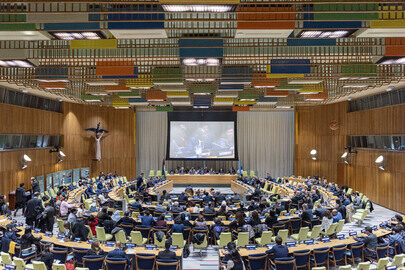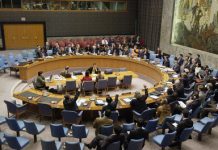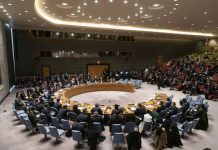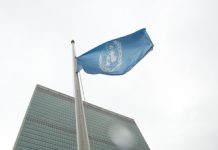There are signs of hope in 2025 amid global turmoil, insists UN chief
The world continues to grapple with unprecedented challenges from the Los Angeles fires to the Ukraine war, but there are also reasons for cautious optimism in 2025 – on a long-awaited ceasefire in Gaza, climate action, gender equality and more – Secretary-General António Guterres insisted on Wednesday.
In his traditional new year address setting out the global organization’s priorities, the UN chief acknowledged that “it is understandable to get overwhelmed”, given the “turmoil” all around us.
Nonetheless, Mr. Guterres highlighted the “largely holding” ceasefire in Lebanon, the fact that “the world now invests almost twice as much in clean energy as it does in fossil fuels” and that “in much of the world, girls have achieved parity in education” – all goals that the United Nations supports.
“We will never lose sight of hope. And we will work to lift the lid on that hope through action. To make it real. To help it spread. Sticking to principles. Speaking the truth. Never giving up.”
On health matters, the UN chief insisted that “more children are surviving today than ever before”, while HIV infections “continue to dramatically decline, along with malaria mortality rates”.
Mr. Guterres also noted that “meaningful new steps” have been taken to reduce child marriage, protect our oceans and expand internet access.
But as the UN begins its 80th year, the Secretary-General also expressed deep concern at climate destruction and the most vulnerable who suffer – and at the runaway AI revolution, that “demands careful stewardship” by countries, under the auspices of the UN’s Global Digital Compact, he insisted.
UN rights chief in historic meeting in Syria’s with caretaker authority in Damascus
The UN human rights chief Volker Türk has described the unbearable suffering of Syria’s former detainees under the fallen Assad regime and insisted that he stands with the people of the war-torn nation as they “rebuild a country that works for all” Syrians.
Speaking from Damascus – a first for any UN High Commissioner for Human Rights – Mr. Türk said that he had heard harrowing testimony from numerous victims of torture. They included some jailed at the notorious Sednaya prison outside Damascus, where his Office documented violations “for years”.
The UN rights chief recounted how prisoners told him that “early in the morning, as they heard the guards at their door, trembling in fear, they retreated to the rear of the cell, fearing they would be hauled out again to be tortured, or even executed.”
Thousands died in prisons throughout Syria, the High Commissioner explained, as he went on to condemn the “apocalyptic wasteland” of the bombed-out residential neighbourhood of Jobar, in Damascus, which he visited.
“Not a single building in the area was spared bombardment in wave after wave of attacks,” Mr. Türk said, adding that it was “inconceivable that such mass killings and destruction” had happened.
It was equally difficult to believe “that banned chemical weapons were used against civilians elsewhere in the country and not just once”, the UN rights chief said. It “says a lot about the extreme brutality of the tactics used by the former regime”, whose acts “constitute some of the most serious crimes under international humanitarian law”, he insisted.
Suspected Marburg virus outbreak declared in Tanzania – WHO
A deadly outbreak of suspected Marburg virus has been declared in Tanzania’s Kagera region where the risk of national and regional spread is high, the UN World Health Organization (WHO) has announced.
The UN health agency said that there have been at least nine suspected cases, including eight deaths. Health workers are among those affected. Patients presented with similar symptoms including high fever, back pain, diarrhoea and vomiting with blood and external bleeding.
The results of testing from samples from two patients are pending but the source of the outbreak is unknown, said WHO.
Kagera region experienced its first Marburg outbreak in March 2023, the UN health agency said. It noted that animal carriers of the disease such as fruit bats remain in the area. The outbreak in March 2023 lasted for nearly two months, with nine cases including six deaths.
Kagera in northeast Tanzania is one of 31 regions in the country bordering Rwanda and Burundi.
WHO said that the regional risk of Marburg spreading “is considered high” because of Kagera’s strategic location “as a transit hub, with significant cross-border movement of the population to Rwanda, Uganda, Burundi and the Democratic Republic of the Congo”.
Don’t forget that you can hear more news and interviews on the UN News audio hub now.
Daniel Johnson, UN News.
Music composed and produced by Joachim Harris. All rights reserved
Source of original article: United Nations (news.un.org). Photo credit: UN. The content of this article does not necessarily reflect the views or opinion of Global Diaspora News (www.globaldiasporanews.com).
To submit your press release: (https://www.globaldiasporanews.com/pr).
To advertise on Global Diaspora News: (www.globaldiasporanews.com/ads).
Sign up to Global Diaspora News newsletter (https://www.globaldiasporanews.com/newsletter/) to start receiving updates and opportunities directly in your email inbox for free.































